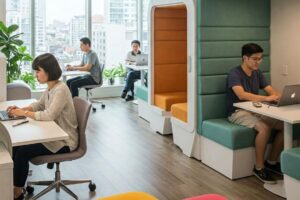Coworking spaces have emerged as a modern alternative to traditional office environments, catering to a diverse range of professionals including freelancers, startups, and remote workers. These collaborative workspaces are characterized by shared facilities and resources, which enable individuals and teams to work side by side while maintaining their independence. The fundamental concept of coworking is rooted in the idea of community, offering an atmosphere that fosters connectivity and collaboration among like-minded individuals.
The benefits of coworking spaces extend beyond simply providing a desk and internet access. One of the primary advantages is flexibility; members often have various options for workspace arrangements, such as hot desks, dedicated offices, and meeting rooms, which can be reserved on an as-needed basis. This adaptability allows businesses to scale their operations without the burdensome long-term leases typical of conventional offices. Additionally, coworking spaces often include amenities such as high-speed internet, printing services, and kitchen facilities, creating a convenient and supportive work environment.
Moreover, the popularity of coworking spaces is underscored by their ability to cater to the evolving needs of the contemporary workforce. As more individuals seek autonomy over their working conditions, coworking spaces provide a solution that combines professional infrastructure with a community-focused approach. They offer networking opportunities that can lead to collaboration, partnerships, and even mentorship. Consequently, these spaces have contributed to a significant cultural shift in the way professionals approach work, making them a vital component of modern business landscapes.
Overall, the increasing demand for coworking spaces signifies a departure from traditional office setups, offering a unique blend of professionalism and community that resonates with today’s dynamic working population.
Assessing Your Needs
Before selecting a coworking space, it is essential to conduct a thorough assessment of your specific needs. Understanding your work habits is the first step in this process. Consider whether you thrive in a bustling environment or prefer a quieter setting. Establishing your preferred work environment will not only enhance your productivity but also influence your overall satisfaction with the space.
Next, take stock of the amenities that are necessary for your work. Different coworking spaces offer various features, such as high-speed internet, conference rooms, and common areas. Determine which amenities are critical for your daily operations and which ones can be considered optional. Additionally, consider factors such as availability of printing services, kitchen facilities, and ergonomic furniture, as these elements can significantly impact your work experience.
Location also plays a pivotal role in the decision-making process. Assess how accessible the coworking spaces are from your home or essential places like clients and partners. A conveniently located space can save you time and enhance your work-life balance. It is advisable to explore various neighborhoods and evaluate not only the convenience but also the surrounding atmosphere that may align with your professional image.
Creating a checklist that outlines your priorities can significantly aid in this assessment. Include categories such as work environment, amenities, and location preferences, and prioritize them based on their importance to your business needs. This systematic approach will streamline the selection process and ensure that you find a coworking space that aligns with your professional requirements and aspirations. Making an informed decision will ultimately contribute to your productivity and overall satisfaction in a coworking setting.
Location, Location, Location
When selecting a coworking space, the adage “location, location, location” is of paramount importance. The geographic location of a coworking space can significantly influence various aspects of your work life, from convenience to productivity. One critical factor to consider is the proximity of the coworking space to your home. A nearby location can save you considerable commuting time, allowing you to allocate more hours to your projects and tasks. In contrast, a longer commute not only can lead to logistical challenges but may also result in decreased motivation and energy levels.
Accessibility to public transport is another essential aspect that should not be overlooked. A coworking space with easy access to trains, buses, or other public transit options makes it more convenient for clients, colleagues, and employees to reach you, enhancing collaboration. Moreover, consider the availability of parking spaces if you plan to drive. A well-connected location can facilitate seamless communication and networking opportunities with fellow professionals.
Beyond transportation, the surrounding amenities contribute significantly to the overall experience. Look for coworking spaces nestled near cafes, restaurants, and shops that can serve as great informal meeting spots or offer quick breaks during your workday. Such amenities can enhance your work experience, providing not only nourishment but also a pleasant environment for both work and relaxation.
Lastly, the location should resonate with your professional image. A prestigious address in a well-regarded district can enhance your brand’s credibility and create a positive impression on clients and partners alike. In conclusion, evaluating the location of a coworking space entails more than just geography; it encompasses convenience, accessibility, amenities, and professional representation, all of which collectively influence your productivity and overall work experience.
Amenities and Facilities
When selecting a coworking space, understanding the available amenities and facilities is crucial as they can significantly enhance your work experience. Distinctive features can range widely among coworking spaces, and evaluating them in relation to your specific work style and business needs will ultimately inform your decision. High-speed internet is an essential amenity that most coworking spaces offer, catering to the demands of modern work environments where seamless connectivity is vital for productivity.
Equally important are meeting rooms, which provide a professional setting for client interactions, team collaborations, and presentations. Depending on your business’s nature, you may require access to various sizes of meeting spaces, equipped with essential audio-visual technology capable of supporting video conferencing and other communication needs. Many coworking spaces also offer private offices, allowing for more concentrated work away from communal areas.
In addition, the provision of office supplies, such as printers, copiers, and stationery, can be a significant advantage, particularly for freelancers and small businesses that may not have a full range of resources at their disposal. Kitchen facilities, including coffee stations, snack bars, and microwaves, contribute to a comfortable working environment, promoting breaks and social interactions among members. Shared communal areas serve as informal meeting spots and can enhance networking opportunities and community building.
Ultimately, the choice of amenities should align with your work habits. For instance, if your work largely requires client meetings, the availability of professional meeting spaces should be a priority. Conversely, if you mainly work independently, a space with ample individual workstations and reliable internet may be more relevant. Assessing these amenities will enable you to choose a coworking space that truly meets your professional needs.
Community and Networking Opportunities
When selecting a coworking space, the community aspect is a crucial factor that should not be underestimated. A vibrant community within a coworking environment can significantly enhance collaboration, networking, and even friendship opportunities among members. The right coworking space fosters an atmosphere of innovation and encouragement, allowing professionals from varied backgrounds to share ideas, provide support, and potentially collaborate on projects. This enhances not only individual productivity but also opens doors for new business partnerships and ventures.
The nature of coworking spaces encourages interaction among members, which can lead to valuable connections. For instance, diverse teams often lead to a melting pot of ideas and perspectives, inspiring creativity and problem-solving. Regular networking events, workshops, and social gatherings hosted by coworking spaces can further nurture these connections. Participating in these activities often leads to a deeper integration within the community, building strong professional relationships and fostering a sense of belonging.
To find a coworking space that cultivates this vibrant community, prospective members should look for open and inclusive environments. Websites and reviews often provide insight into the culture of the space, and many coworking providers offer trial days or tours, which can allow potential members to gauge the atmosphere before committing. It can also be beneficial to inquire about the community programs in place, such as mentorship opportunities, skill-sharing sessions, or networking events. Ultimately, a suitable coworking space should not only meet the pragmatic needs of working but also offer a nurturing environment where community engagement thrives. In doing so, individuals can maximize their professional opportunities through a supportive network of peers, making the venture into a coworking space a strategically advantageous decision.
Budget Considerations for Choosing a Coworking Space
When selecting a coworking space, budget considerations play a critical role in the overall decision-making process. Understanding the various pricing models available—such as hot desks, dedicated desks, and private offices—can help you make an informed choice. Hot desks generally offer the most economical option, allowing members to utilize shared spaces on a first-come, first-served basis. This model is particularly suitable for freelancers and occasional users who prioritize flexibility. Conversely, dedicated desks provide a consistent workspace for individuals who need a more stable environment, often at a higher monthly rate.
Private offices are another category worth considering, particularly for teams or individuals seeking more privacy and control over their environment. While these options typically come at a premium price, they can foster productivity and collaboration within a more secure setting. As you evaluate these choices, it is crucial to assess whether the costs align with your financial capabilities and expected usage of the space.
In addition to understanding the pricing models, it is important to weigh the benefits of long-term contracts against flexible memberships. Long-term contracts might offer lower monthly rates but can lock you into commitments that may not suit your evolving needs. On the other hand, flexible memberships often allow for shorter terms or on-demand usage, but they may come at a higher cost. Therefore, it’s essential to assess your specific requirements, such as the anticipated duration of use and the potential for business fluctuations, before making a decision.
Ultimately, the goal is to find a coworking space that provides value for money while accommodating your professional needs. By carefully evaluating your options and aligning them with your budget, you can select a coworking solution that supports your work style effectively.
Trial Periods and Flexibility
When exploring coworking spaces, one of the most advantageous options is the availability of trial periods or flexible rental terms. These features allow individuals or businesses to assess whether a specific coworking environment aligns with their professional needs and lifestyle before committing to a long-term lease. Trial periods are particularly beneficial for freelancers, startups, and remote workers who may not yet have a concrete understanding of their workspace preferences.
Numerous coworking spaces recognize the importance of this initial evaluation and offer free trial days or discounted short-term memberships. This approach enables potential members to immerse themselves in the community, experience the resources available, and evaluate the overall atmosphere. Factors such as noise levels, amenities, networking opportunities, and overall comfort can significantly impact productivity and should be experienced in real-time. By engaging in this trial phase, individuals can make informed decisions that resonate with their work styles.
Furthermore, flexibility in membership terms can alleviate any reservations associated with long-term commitments. Many coworking spaces now provide month-to-month agreements or options to scale membership based on an individual’s changing needs. This flexibility allows members to adapt their workspace arrangements in response to the evolution of their projects or teams, without facing the constraints of a lengthy lease. For example, as a business expands, it may require additional desk space or private offices. Having the ability to modify the workspace arrangements helps in accommodating growth without the burden of unnecessary costs.
In summary, trial periods and flexible terms are crucial elements in the selection process of a coworking space. They empower potential members to confidently choose an environment that enhances productivity while ensuring long-term satisfaction with their workspace decision.
Researching and Visiting Potential Spaces
Choosing the right coworking space is a crucial decision that can significantly impact productivity and overall work satisfaction. To make an informed choice, it is essential to conduct thorough research and evaluations of different coworking environments. This process begins with online research, where prospective members can start by utilizing dedicated websites that list various coworking spaces in their area. These platforms often provide details such as amenities, pricing, and availability, which are all pivotal in narrowing down options.
Once a preliminary list of potential coworking spaces has been created, it is advisable to delve into user reviews and testimonials. Platforms like Google Reviews or coworking-specific review sites can offer valuable insights into the experiences of other members. These evaluations often highlight the space’s atmosphere, community engagement, and management responsiveness, all integral factors to consider. Additionally, pay attention to the types of businesses and professionals currently utilizing these spaces, as this can indicate the potential for networking opportunities and collaboration.
However, online research alone may not suffice in selecting the right coworking space. It is essential to visit various locations in person. A physical visit allows for firsthand experience of the environment, culture, and amenities. When touring potential spaces, observe aspects such as noise levels, seating arrangements, and general ambiance. Engaging with current members and staff during these visits can provide deeper insights into the coworking community.
By combining thorough online research with in-person evaluations, individuals can make a well-rounded assessment of each coworking space’s suitability. This comprehensive approach ultimately ensures that the chosen location aligns with personal work styles and professional needs.
Making a Decision
Choosing the right coworking space involves a careful evaluation of several factors that cater to your specific needs. Once you have gathered all necessary information about various options, it is crucial to approach the decision-making process methodically. Begin by listing the pros and cons of each location you are considering. This visual representation can aid in clarifying the unique benefits and drawbacks associated with each coworking space. For instance, you might want to consider amenities such as high-speed internet, meeting rooms, and on-site coffee options, alongside factors like location accessibility and price.
Moreover, it is essential to assess the work environment. Some coworking spaces foster a collaborative atmosphere, while others may provide a more subdued and focused setting. Your preferred work style plays a significant role in determining which space will best support your productivity. While jotting down the characteristics of each coworking area, don’t overlook the culture and community that each location promotes. Networking opportunities, social events, and shared values can greatly enhance your overall experience.
As you weigh your options, it is important to trust your instincts. Pay attention to how each coworking space makes you feel during visits. A space that resonates with your professional aspirations can positively influence your work efficiency. Additionally, consider reaching out to current members of the coworking community for their insights; their firsthand experiences can provide valuable context that isn’t always apparent in online reviews or formal descriptions.
Ultimately, make a decision that feels right to you, aligning both your professional goals and personal comfort. Remember that choosing a coworking space is not just about physical attributes, but about finding a suitable environment that encourages creativity and collaboration while making your work experience enjoyable.



